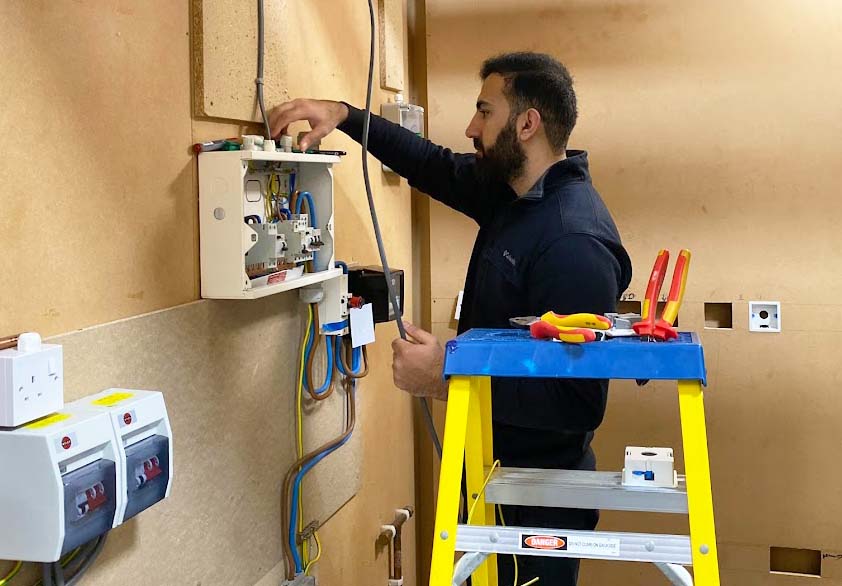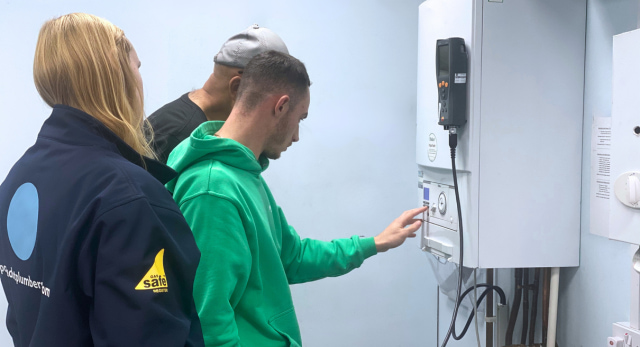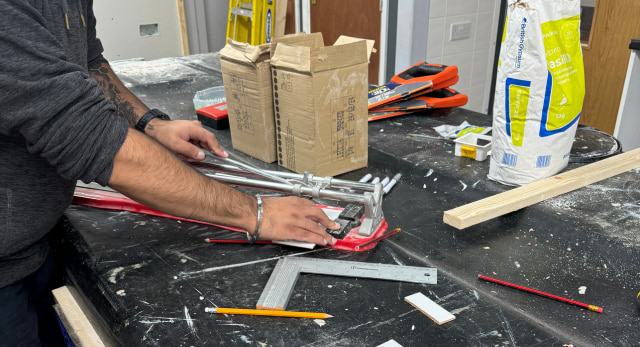The 18th Edition Wiring Regulations, officially known as BS 7671:2018+A2:2022, set the benchmark for electrical safety in the UK. The 18th edition wiring regulations are essential for electricians, as well as related trades (gas and heating engineers, kitchen fitters and plumbers) who wire in electrical appliances, for example, showers or cookers. In this post, we’ll explore the key aspects of the regulations, recent updates, why staying compliant is critical and answer some of your most frequently asked questions.
What Are the 18th Edition Wiring Regulations?
The 18th Edition Wiring Regulations, published by the Institution of Engineering and Technology (IET), provide guidelines on designing, installing, and maintaining electrical installations in compliance with UK standards. They apply to all types of installations, including domestic, commercial, and industrial properties.
The regulations aim to:
- Ensure electrical safety.
- Standardise practices across the industry.
- Incorporate new technologies and innovations.
The 18th Edition contains regulations covering the specification, design, installation and inspection, testing and verification of electrical installations in domestic and commercial buildings, including:
- Part 1 – Scope, Object and Fundamental Principles
- Part 2 – Definitions
- Part 3 – Assessment of General Characteristics
- Part 4 – Protection for Safety
- Part 5 – Selection and Erection of Equipment
- Part 6 – Inspection and Testing
- Part 7 – Special Installations or Locations
Key updates were introduced in the 2022 amendment, such as new rules for prosumer installations and energy efficiency measures.
What’s New in the 18th Edition Regulations?
The most recent amendment (A2:2022) introduced several significant changes to align with modern electrical demands:
| Key Changes | Details |
| Prosumer Electrical Installations | New requirements for installations combining energy production and consumption (e.g., solar panels). |
| Energy Efficiency | Measures to improve energy efficiency, including load management and power-factor correction. |
| Arc Fault Detection Devices (AFDDs) | Expanded use of AFDDs to mitigate fire risks in residential properties. |
| Section Updates | Updates to sections on earthing, wiring systems in construction sites, and special installations. |
For a more detailed summary, visit the IET’s resources.
Why Do the 18th Edition Wiring Regulations Matter?
Legal Compliance
Non-compliance with BS 7671 can lead to severe consequences, including legal penalties and invalid insurance claims. It is essential for electricians to hold an up-to-date understanding of the regulations and demonstrate competency by completing an 18th Edition training course.
Enhanced Safety
The regulations are designed to prevent electrical hazards such as shock, fires, and equipment damage. The inclusion of AFDDs, for example, provides additional protection against electrical fires, particularly in high-risk settings like residential care homes.
Future-Proofing Electrical Systems
With the rise of renewable energy and smart technology, the updated regulations ensure that installations can accommodate modern innovations such as solar panels, electric vehicle (EV) chargers, and battery storage systems.
How Do the Regulations Compare to Previous Editions?
The table below highlights the main differences between the 18th Edition and its predecessor, the 17th Edition:
| Aspect | 17th Edition | 18th Edition |
| AFDD Requirements | Not mandatory | Recommended in specific cases |
| Energy Efficiency | Not covered | Incorporated |
| EV Charging Points | Basic requirements | Detailed safety provisions |
| Prosumer Systems | Not addressed | Comprehensive guidelines |
Who Needs to Be Compliant?
The 18th Edition is crucial for:
- Electricians: To carry out compliant installations and stay competitive.
- Contractors: For managing projects safely and adhering to standards.
- Designers: Ensuring new builds are future-proof and energy-efficient.
Other tradespeople like plumbers and kitchen fitters can benefit from completing an 18th Edition Wiring Regulations Training Course. This is because they will often work with electrical appliances.
Do all electricians need to complete an 18th Edition course?
All electrotechnical workers in the UK must work to the standards set out in the 18th Edition of the Wiring Regulations. Completing an 18th Edition course is the best way to achieve compliance.
Training is highly recommended to ensure a thorough understanding, particularly following the release of a new edition, and is required to join a recognised Competent Person Scheme (CPS) and apply for an ECS card. Most companies require 18th Edition training as a pre-requisite to securing work.
Electricians are not expected to memorise the big book, but they should be familiar with key regulations and should always carry a copy with them.
How much does the 18th Edition course cost?
The standard price of 18th Edition training is £485 + VAT and is available at our training centres across the South-East, in Northolt, Luton, Basildon and Sittingbourne. You can find more information on our 18th Edition Wiring Regulations Training Course here.
Key Takeaways for Professionals
-
- Stay Updated: Regularly review amendments to the regulations.
- Invest in Training: Completing an 18th Edition course is essential for career progression.
- Adapt to Change: Embrace new technologies and practices like prosumer systems and energy efficiency measures.
- Focus on Safety: Prioritise installations that reduce hazards and enhance protection.
Conclusion
The 18th Edition Wiring Regulations are more than just guidelines; they are the foundation for a safer, more efficient electrical industry. By understanding and applying these regulations, tradespeople can ensure compliance, enhance safety, and future-proof installations. Whether you are an electrician, contractor, or related tradesperson, staying ahead in this dynamic field starts with the 18th Edition.









